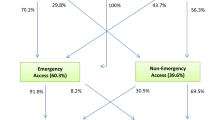Abstract
Background
The duration of untreated psychosis (DUP) is a potentially modifiable determinant of the early course of nonaffective psychotic disorders, though a paucity of research has addressed determinants of DUP. Recent data from London and Nottingham, UK indicated that a shorter DUP was predicted by: (1) an acute mode of onset, (2) employment, and (3) active involvement of at least one family member in seeking evaluation (Morgan et al. Br J Psychiatry 189:446–452, 2006). The present analysis was conducted in an effort to replicate those findings in a predominantly low-income, urban, African American sample.
Method
DUP and the three key predictors of interest were assessed using standardized procedures. All analytic plans replicated those of Morgan and colleagues (Morgan et al. Br J Psychiatry 189:446–452, 2006) to the largest extent possible. Sufficient information was available to rate DUP for 73 patients.
Results
The median DUP was 23.4 weeks. Bivariate tests, survival analysis, and Cox regression revealed that an insidious mode of onset was associated with a substantially longer DUP compared with an acute onset, and that family involvement in help-seeking was independently associated with a longer duration.
Conclusions
While mode of onset is a reliable illness-related determinant of DUP, further research is needed on the complex ways in which family-related variables influence DUP.


Similar content being viewed by others
References
Cockrell JR, Folstein MF (1988) Mini-mental state examination (MMSE). Psychopharmacol Bull 24:689–692
Compton MT, Carter T, Bergner E, et al (2007) Defining, operationalizing, and measuring the duration of untreated psychosis (DUP): advances, limitations, and future directions. Early Interv Psychiatry 1:236–250
Compton MT, Esterberg ML, Druss BG, et al (2006) A descriptive study of pathways to care among hospitalized urban African American first-episode schizophrenia-spectrum patients. Soc Psychiatry Psychiatr Epidemiol 41:566–573
Compton MT, McGlashan TH, McGorry PD (2007) Toward prevention approaches for schizophrenia: an overview of prodromal states, the duration of untreated psychosis, and early intervention paradigms. Psychiatr Ann 37:340–348
Drake RJ, Haley CJ, Akhtar S, et al (2000) Causes and consequences of duration of untreated psychosis in schizophrenia. Br J Psychiatry 177:511–515
First MB, Spitzer RL, Gibbon M, et al (1998) Structured clinical interview for DSM-IV axis I disorders. Biometrics Research Department, New York State Psychiatric Institute, New York
Folstein MF, Folstein SE, McHugh PR, et al (2001) Mini-mental state examination: user’s guide. Psychological Assessment Resources, Inc, Odessa
Goulding SM, Leiner AS, Thompson NJ, et al. (2008) Family strengths: a potential determinant of the duration of untreated psychosis among hospitalized African-American first-episode patients. Early Interv Psychiatry 2:147–153
Jablensky A, Sartorius N, Ernberg G, et al (1992) Chapter 2. Sociodemographic, clinical and diagnostic description of the study population. Psychol Med 20(Suppl):18–42
Marshall M, Lewis S, Lockwood A, et al (2005) Association between duration of untreated psychosis and outcome in cohorts of first-episode patients: a systematic review. Arch Gen Psychiatry 62:975–983
McGlashan TH (1999) Duration of untreated psychosis in first-episode schizophrenia: marker or determinant of course? Biol Psychiatry 46:899–907
Melle I, Larsen TK, Haahr U, et al. (2004) Reducing the duration of untreated first-episode psychosis: effects on clinical presentation. Arch Gen Psychiatry 16:143–150
Morgan C, Abdul-Al R, Lappin JM, et al (2006) Clinical and social determinants of duration of untreated psychosis in the ÆSOP first-episode psychosis study. Br J Psychiatry 189:446–452
Møller P (2000) First-episode schizophrenia: do grandiosity, disorganization, and acute initial development reduce duration of untreated psychosis? An exploratory naturalistic case study. Compr Psychiatry 41:184–190
Møller P (2001) Duration of untreated psychosis: are we ignoring the mode of initial development? An extensive naturalistic case study of phenomenal continuity in first-episode schizophrenia. Psychopathol 34:8–14
Norman RMG, Malla AK (2001) Duration of untreated psychosis: a critical examination of the concept and its importance. Psychol Med 31:381–400
Norman RMG, Malla AK (2002) Course of onset and relapse schedule: interview and coding instruction guide. Prevention and Early Intervention for Psychosis Program, London, Ontario, Canada
Olson D, McCubbin H, Barnes H, et al (1985) Family inventories used in a national survey of families across the family life cycle. University of Minnesota, St. Paul
Perkins DO, Gu H, Boteva K, et al (2005) Relationship between duration of untreated psychosis and outcome in first-episode schizophrenia: a critical review and meta-analysis. Am J Psychiatry 162:1785–1804
Perkins DO, Leserman J, Jarskog LF, et al (2000) Characterizing and dating the onset of symptoms in psychotic illness: the symptom onset in schizophrenia (SOS) inventory. Schizophr Res 44:1–10
Phillips L, Yung AR, Hearn N, et al (1999) Preventative mental health care: accessing the target population. Aust NZ J Psychiatry 33:912–917
Vaglum P (1996) Earlier detection and intervention in schizophrenia: unsolved questions. Schizophr Bull 22:347–351
Acknowledgments
This research was supported by a grant from the National Institute of Mental Health (K23 MH067589). We wish to thank the ACES Project team members who participated in data collection, including Michelle Esterberg, Tandrea Carter, Erin Bergner, Lauren Franz, Tarianna Stewart, Kevin Tessner, and Hanan Trotman.
Author information
Authors and Affiliations
Corresponding author
Rights and permissions
About this article
Cite this article
Compton, M.T., Chien, V.H., Leiner, A.S. et al. Mode of onset of psychosis and family involvement in help-seeking as determinants of duration of untreated psychosis. Soc Psychiat Epidemiol 43, 975–982 (2008). https://doi.org/10.1007/s00127-008-0397-y
Received:
Accepted:
Published:
Issue Date:
DOI: https://doi.org/10.1007/s00127-008-0397-y




